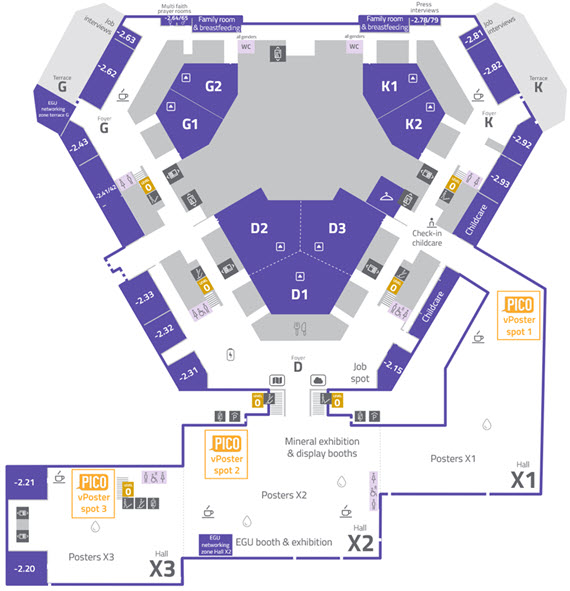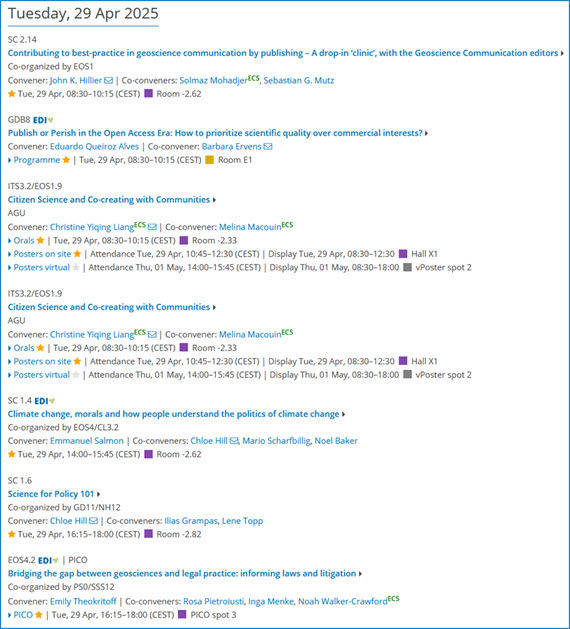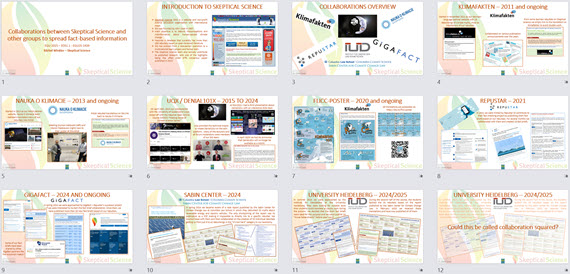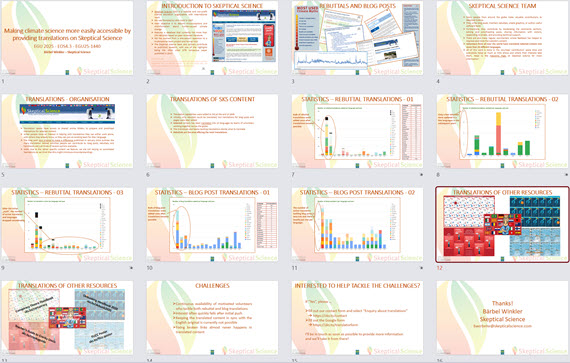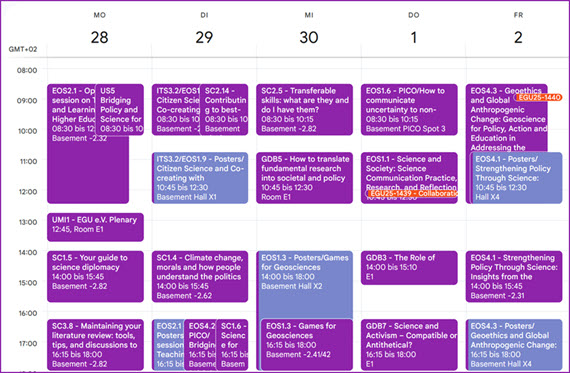EGU2025 – Picking and chosing sessions to attend on site in Vienna
Posted on 14 April 2025 by BaerbelW
This year’s General Assembly of the European Geosciences Union (EGU) will take place as a fully hybrid conference in both Vienna and online from April 27 to May 2. This year, I’ll join the event on site in Vienna for the full week and I’ve already picked several sessions I plan to attend. Among them are two sessions, I’ll be presenting in. This blog post provides an overview of my itinerary.
Monday
To start my week at EGU25, I plan to attend a Union Symposia (US5) at 8:30am: Bridging Policy and Science for EU Disaster Preparedness
One of the greatest risks to our security is the impact of climate change. Extreme weather continues to ravage ever greater areas of Europe through floods, fires and droughts, throughout the year and across the European Union. The EU’s new strategic agenda for 2024-2029 states that it will strengthen its resilience, preparedness, crisis prevention and response capacities in an all-hazards and whole-of-society approach to protect its citizens and societies against different crises, including disasters.
The EU funds research & innovation through Horizon Europe projects but also with multiple other instruments and channels. The needs of the EU, reflecting those of its Member States, for scientific output to address and support disaster risk reduction policy, prevention & preparedness capacity-building, and emergency operations are continuous. These gaps are reflected in policy or operational documentation, such as the political guidelines for the next European Commission 2024-2029 and the Union’s Disaster Resilience Goals. Among others, we should look at all facets of crisis and disaster management, along community resilience building.
This session aims to create a dialogue between EU-wide policy-based scientific needs for Disaster Resilience and the scientific community of the EGU. It will inform the scientific community how to interpret the latest policy documentation in orienting their research and funnel their planning and output back to the EU’s needs to have an impact and added value for society. The European Commission will be represented by the DG for European Civil Protection and Humanitarian Aid Operations as well as DG Joint Research Centre.
After US5 and the coffee break, I plan to join EOS2.1 at 10:45am: Open session on Teaching and Learning in Higher Education which might provide some wide-ranging food for thought about how to effectively communicate science topics.
In this session we encourage contributions of general interest within the Higher Education community which are not covered by other sessions. The session is open to all areas involving the teaching of geoscience and related fields in higher education with a particular interest in current innovations and trends in geoscience education research. Examples might include describing a new resource available to the community, presenting a solution to a teaching challenge, pros and cons of a new educational technique/technology e.g. generative AI and chat bots, linking science content to societally relevant challenges/issues, developing critical thinking skills through the curriculum and effective strategies for online/remote instruction and/or hybrid/blended learning. Our intent with this session is to foster international discourse on common challenges and strategies for educators within the broader field of Earth Sciences – let’s share, discuss and develop effective practice.
My afternoon will be filled with two short courses. The first one will be SC1.5 Your guide to science diplomacy at 14:00pm.
Global challenges, such as climate change and natural hazards, are becoming increasingly complex and interdependent, and solutions have to be global in scope and based on a firm scientific understanding of the challenges we face. At the same time, Science and technology are playing an increasingly important role in a complex geopolitical landscape. In this difficult setting, scientific collaboration can not only be used to help address global challenges but also to foster international relations and build bridges across geopolitical divisions. Science diplomacy is a broad term used both to describe the various roles that science and researchers play in bridging geopolitical gaps and finding solutions to international issues, and also the study of how science intertwines with diplomacy in pursuing these goals.
During this Short Course, experts will introduce key science diplomacy concepts and outline the skills that are required to effectively engage in science diplomacy. They will also provide practical insights on how researchers can actively participate in science diplomacy, explore real-life examples of science diplomacy, and highlight resources where participants can learn more about science diplomacy moving forward.
The second short course on my list is SC3.8 Maintaining your literature review: tools, tips, and discussions to help keep up with evolving research. Given the interactive nature of most of these short courses, I may even be able to plug our weekly New Research articles published on Thursdays by Doug and Marc!
Staying up-to-date with the latest research in your field can be challenging, with new scientific papers, news articles, and regulations constantly emerging. Fortunately, there are ways to stay informed. In this session, we offer practical advice on maintaining an up-to-date literature review over the long term. We’ll cover essential tools and strategies for identifying relevant works, organizing them, and referring back to them as your field evolves. Join us for an engaging conversation where participants can exchange insights and learn from each other’s experiences in navigating their literature review.
Turns out that most of the sessions I picked – apart from US5 – have rooms assigned in the “-2 basement” level which sounds as if it’s underground. Luckily enough, that’s not the case and that level even features two outside terraces which – weather permitting – might be nice spots to join sessions virtually should the assigned rooms be overcrowded!
Figure 1: Floor plan Level -2 Basement at the Austria Center Vienna (ACV) where the EGU meetings are held each year. The full floor plan is available here if you’d like to get an impression of the venue’s size.
Tuesday
I may start day 2 at EGU with short course SC2.14 Contributing to best-practice in geoscience communication by publishing – A drop-in ‘clinic’, with the Geoscience Communication editors as we have been working on a drafted paper for just that journal last year.
Your geoscience is important, and it can make a difference to the world! But, you need to communicate this! Our journal’s mission is to publish the research on best practice, so we all learn how to be the best communicators we can. This session is to help you publish about the tools, tips and techniques you use to create impact in your educational, outreach, or engagement (e.g. with government, industry) work.
The session is a drop-in ‘clinic’ with the journal editors, so bring your initial ideas, ‘stupid’ questions, research plans, or even draft papers!
Questions might include:
- How do I get started? – I’ve got a great outreach idea, but how do I use and contribute to best practice?
- How do I collect evidence / data? – The guts e.g. methods & statistics
- What does robust ‘research’ about communication look like? i.e. what a paper needs.
The session will consist of roughly 10 mins of us talking, followed by small group or 1-to-1 discussion with a Geoscience Communication editor, sitting around 3-4 tables.
It doesn’t matter if you know very little already. No question is too basic. Or, you’re an experienced geoscience communication practitioner; then, we can help you get the reputational benefit comes with publication.
Another option in the same timeslot in the morning is the oral session ITS3.2/EOS1.9 Citizen Science and Co-creating with Communities. But if I don’t manage to go there, I’ll have the corresponding poster session as an alternative.
Knowledge co-creation is key for participatory and transdisciplinary research and is often described as “science with society”, rather than science for society. Co-creation, co-production, and co-design refer to methods of participatory collaborative research, with adjacent terms including “public engagement”, or “community-led”. All these methods are becoming increasingly recognised as necessary for solving complex societal and sustainability problems and challenges such as climate change, with joint efforts required from academia, enterprises, governments, and local/indigenous communities. Another advantage of co-creating with communities is that collaboratively designed solutions are more likely to be implemented and sustained long-term.
There are a wide variety of co-creation methodologies, including citizen science methods, which differ in levels of community collaboration depending on the question and goals of knowledge production. This session welcomes topics and case studies of co-creation from all disciplines and levels of participation of non-academic actors, from community consultation during the planning phases of the project goals to citizen scientists as data crowdsourcing. The idea is to not only highlight best practice, but also identify challenges associated with community co-creation. By sharing major learnings, best practices, and strategies, the session aims to promote increased participatory methods in mainstream science activities. Those participating in the session may also choose to submit a full paper in a special issue of Geoscience Communication (an EGU journal that covers outreach, public engagement, widening participation, and knowledge exchange in the geosciences), which will be based on the contributions of this session.
This session is a call for researchers to recognise that they are more than mere observers, and that non-academia actors are more than those observed. By enabling discussions and knowledge production on equal basis, transdisciplinary co-creation can empower communities, especially underrepresented communities who are often not heard.
Another short course offered in the afternoon piqued my interest, especially in light of what is currently happening in the U.S. where this type of research is getting suppressed by all means possible: SC1.4 Climate change, morals and how people understand the politics of climate change.
How can scientists and governments ensure that their communication resonates more deeply with citizens without resorting to the manipulative tactics used by those who seek to undermine liberal democracy? How can scientific and government actors ensure their communications are equally meaningful and ethical?
This Short Course will combine insights from state-of-the-art scientific knowledge, novel empirical research on values-targeted communication strategies, and a deep understanding of practitioners’ and citizens’ attitudes on these topics. Examples from the European Commission’s Joint Research Centre will be used to share practical guidance for scientists who need to successfully navigate the policy world.
For the final slot of the day, I’ll need to make a decision – again – between two sessions I’m interested in. EOS4.2 Bridging the gap between geosciences and legal practice: informing laws and litigation which is a PICO session with a whirlwind of 2-minute long elevator pitches followed by an hour talking with the authors at their assigned large screens.
Climate change represents one of the defining societal challenges of the 21st century. However, the response to this challenge remains largely inadequate across the board. Both in terms of mitigation and adaptation, measures currently taken by countries or companies fall short of what is required to ensure a safe and healthy life for populations around the globe, both today and in the future. The past and continued failure to address climate change results in extreme weather events causing damages and losses, as well as the prospect of further worsening impacts. Insufficient emission reductions exacerbate existing vulnerabilities and lead to increasingly unsafe living conditions in the future. The shortfall in climate action has led citizens to take up legal action to either receive compensation for suffered climate damages or force decision makers to commit to the necessary emissions reductions. In this session, we invite contributions that help bridge the gap between the legal practice of climate litigation and the geosciences. This can include new scientific methods that can support legal efforts, and inter- and transdisciplinary perspectives on how to integrate geoscience insights in litigation, and how to communicate scientific findings to legal practitioners and society at large, in light of legal and ethical aspects of climate change. We also welcome contributions assessing questions of climate change and impact attribution, responsibility, human rights, burden sharing of efforts, translation between science and law, and communication of scientific findings, that link beyond disciplinary boundaries.
Or short course SC1.6 Science for Policy 101, a session I already joined a few times in the past and which has always been interesting.
Science for policy is the practice of integrating scientific knowledge into policymaking to ensure that scientific evidence is available for policymakers when making decisions. There are some basic considerations for engaging in science for policy that can help get you started, from considering how you frame your message, looking for windows of opportunity, and more.
This session will start by diving into some of the basics of policy, enabling participants to understand what science for policy is and how they can start engaging with it. The tips for engaging are relevant to all career stages and will also help you understand the different paths available depending on the level of engagement you are interested in.
The session will then introduce experts working on the science for policy interface to highlight specific skills that researchers can develop to increase their policy impact and provide some practical examples.
Wednesday
Wednesday looks to be a “slow” day for me with not (yet!) a lot of sessions to attend. It’ll kick off with a short course in the morning slot
SC2.5 Transferable skills: what are they and do I have them?
Anyone entering the job market or looking for a new job after academia will confront the phrase ‘transferable skills’. PhD candidates and scientists are advised to highlight their transferable skills when applying for non-academic jobs, but it can be hard to know what these skills are. Similarly, for those looking to change scientific research areas or take a leap into a new field for their PhD, it is important to highlight your transferable skills. Big data analysis, communicating your findings, supervising, teaching, project management and budgeting are skills you might have from your research/science career. But there are many more. In this interactive workshop, we will start your journey of identifying your transferable skills and highlighting careers where these will be necessary!
After the coffee break, I plan to join my first Great Debate of the week with GDB5 How to translate fundamental research into societal and policy impact.
Research fundings enable Europe to drive innovation, address societal challenges, and maintain global competitiveness. While the value and benefit of applied research is relatively easy to understand for policymakers and the public, the link between fundamental research and societal value is less evident for them. As a consequence, it is increasingly clear that Europe lags behind other major powers in terms of investment in transformative frontier research and that this threatens its future.
[…]This Great Debate will explore the procedures to bring research results closer to policy, economy and society.
Involvement of researchers in policymaking and other societal actions appears to be limited, often not well recognised, and not easily accessible. In addition, the interest in specific projects usually fades away after their termination whereas the repercussion of obtained results may only arrive later. Knowledge hub, government Scientific Advisory Boards or Science Advice Mechanisms are not systematically in place across Europe.
During this session, panellists from European research funding, scientific, and policy communities will debate: How can individual researchers contribute effectively in societal and policy actions? Which mechanisms should be created to facilitate the harnessing of research results? Should the use of research results be left in the hands of dedicated professionals (e.g., officers at the research institutions)? What is the role of Scientific Advisory Boards? And where is research budget best invested?
In the afternoon I’ll most likely first peruse the posters and then listen to the orals for EOS1.3 Games for Geoscience. This is always a fun session to join due to the creativity involved in combining science and playing games.
Games have the power to ignite imaginations and place you in someone else’s shoes or situation, often forcing you into making decisions from perspectives other than your own. This makes them powerful tools for communication, through use in outreach, disseminating research, in education and teaching at all levels, and as a method to train the public, practitioners, and decision-makers in order to build environmental resilience.
Games can also inspire innovative and fun approaches to learning. Gamification and game-based approaches add an extra spark of engagement and interaction with a topic. Gaming technology (e.g. virtual reality) can transport and immerse people into new worlds providing fascinating and otherwise impossible experiences for learners.
In this session we welcome contributions from anyone who has used games, gaming technology, and/or game-based approaches in their research, their teaching, or public engagement activities.
Visit https://www.games4geoscience.wordpress.com to learn more about the session.
Thursday
Not sure if attending a PICO-session at 8:30 in the morning is a good way to properly wake up but I’ll have a chance to find out with EOS1.6 How to communicate uncertainty to non-expert audiences.
All science has uncertainty. Global challenges such as the Covid-19 pandemic and climate change illustrate that an effective dialogue between science and society requires clear communication of uncertainty. Responsible science communication conveys the challenges of managing uncertainty that is inherent in data, models and predictions, facilitating the society to understand the contexts where uncertainty emerges and enabling active participation in discussions. This session invites presentations by individuals and teams on communicating scientific uncertainty to non-expert audiences, addressing topics such as:
(1) Innovative and practical tools (e.g. from social or statistical research) for communicating uncertainty
(2) Pitfalls, challenges and solutions to communicating uncertainty with non-experts
(3) Communicating uncertainty in risk and crisis situations (e.g., natural hazards, climate change, public health crises)
Examples of research fitting into the categories above include a) new, creative ways to visualize different aspects of uncertainty, b) new frameworks to communicate the level of confidence associated with research, c) testing the effectiveness of existing tools and frameworks, such as the categories of “confidence” used in expert reports (e.g., IPCC), or d) research addressing the challenges of communicating high-uncertainty high-impact events.
This session encourages you to share your work and join a community of practice to inform and advance the effective communication of uncertainty in earth and space science.
The next session will include the first of my presentations this year at EGU. EOS1.1 Science and Society: Science Communication Practice, Research, and Reflection.
Science communication includes the efforts of natural, physical and social scientists, communications professionals, and teams that communicate the process and values of science and scientific findings to non-specialist audiences outside of formal educational settings. The goals of science communication can include enhanced dialogue, understanding, awareness, enthusiasm, improving decision making, or influencing behaviors. Channels can include in-person interaction, online, social media, mass media, or other methods. This session invites presentations by individuals and teams on science communication practice, research, and reflection, addressing questions like:
- What kind of communication efforts are you engaging in and how you are doing it?
- How is social science informing understandings of audiences, strategies, or effects?
- What are lessons learned from long-term communication efforts?
This session invites you to share your work and join a community of practice to inform and advance the effective communication of earth and space science.
My oral slot is scheduled for (high) noon and I’ll have ~8 minutes to talk about Collaborations between Skeptical Science and other groups to spread fact-based information. And while I only mention two collaboration projects in my abstract, I’ll actually present a few more in the time available.
Skeptical Science is a volunteer-run website publishing refutations of climate misinformation. Some members of the Skeptical Science team actively research best-practices refutation techniques while other team members use these findings to share debunking techniques effectively either in writing or through presentations. During 2024, our team collaborated with other groups specializing in fact checking and countering misinformation about the climate crisis. With this submission we highlight two of these collaborations:
- Creating fact briefs in collaboration with Gigafact
Fact briefs are short, credibly sourced summaries that offer “yes/no” answers in response to claims found online. They rely on publicly available, often primary source data and documents. Fact briefs are created by contributors to Gigafact — a nonprofit project looking to expand participation in fact-checking and protect the democratic process.
- Turning a PDF-based report refuting 33 climate solutions myths into stand-alone rebuttals
In early 2024 we spotted an impressive report addressing climate solutions misinformation, “Rebutting 33 False Claims About Solar, Wind, and Electric Vehicles,” written by members of the Sabin Center for Climate Change Law at Columbia Law School. We collaborated with the authors to create 33 stand-alone rebuttals based on the report’s content to make it possible to link to each of the rebuttals directly.
Both of these collaborations help with sharing fact-based information in order to counter mis- and disinformation spread online.
Here is a sneak peak of my drafted presentation:
In the afternoon, I have the choice between listening to many more presentations in EOS1.1 or join one or two Great Debates. GDB3 The Role of Large Language Models (LLMs) in Transforming Geosciences: Friend, Foe, or Fad?
Large Language Models (LLMs) and other advanced AI tools are reshaping how researchers and practitioners approach data analysis, synthesis, and communication across Geosciences. This Great Debate at the EGU General Assembly 2025 aims to critically examine the impact of LLMs in fields such as Seismology, Atmospheric Sciences, and Earth and Space Science Informatics. As these models grow increasingly capable of interpreting complex datasets, generating predictive models, and even drafting research manuscripts, they raise profound questions about their role and limitations in scientific workflows.
The discussion will address key issues, such as the potential of LLMs to accelerate discovery through data-driven insights, their capacity to support real-time decision-making during natural hazards, and the ethical considerations of AI-generated content in peer-reviewed publications. Are LLMs a transformative tool that can bridge knowledge gaps and facilitate interdisciplinary research, or do they risk introducing bias, reducing transparency, and undermining traditional scientific rigour? The panel will provide diverse perspectives on these questions.
We will also address the need for proper training, education, and guidelines to avoid misuse.
The Great Debate GDB7 Science and Activism – Compatible or Antithetical? might spark quite some discussions between the panelists and audience!
Many of the challenges of today raise difficult questions about what the role of scientists should be in relation to issues from climate change and Net Zero policies to implementation of nature-based solutions to reduce risk of flooding, drought and diffuse pollution. Scientists working in such areas are understandably passionate about their areas of research and practice and there is a strong temptation to be active in promoting certain policies and action. However, there is a real tension between the need for objectivity as a scientist and pursuing an activist agenda. Is it possible to do both without compromising our integrity as scientists? This debate will explore this tension in conversation between the audience and an expert panel. Come along, hear the arguments and have your say!
Friday
The last day of EGU25 starts with the session I’ll have my 2nd presentation in EOS4.3 Geoethics and Global Anthropogenic Change: Geoscience for Policy, Action and Education in Addressing the Climate and Ecological Crises.
Geoethics is essential for addressing global crises such as climate change, ecological degradation, and resource overexploitation. The integration of ethical principles at the heart of geoscience allows us to make more sustainable, equitable, and informed decisions.
Geoscientists play a key role in providing accurate and unbiased data to policymakers, and in helping to ensure that decisions reflect the full range of environmental, social, and economic impacts. Their responsibility however extends beyond the sole providing of information: They can actively engage with policymakers and the public to tackle critical challenges, including climate change, ocean degradation, biodiversity loss, pollution and the conflicts driven by fossil fuel dependency.
Despite increasing advocacy for transformative solutions, global efforts remain insufficient to address the climate and ecological crises. As global warming nears the 1.5°C threshold (WMO), the primary obstacle to climate action is not as much a lack of awareness, than resistance and denial from powerful vested interests. In the meantime, many institutions, including universities and research centres, tend to reinforce the status quo instead of driving necessary change.
[…]
This session seeks to inspire dialogue, showcase innovative practices and explore the evolving role of geoscience in cultural, policymaking, and societal change.
My presentation is scheduled for 8:50 so I hope to be “wide awake” then in order to tell participants about Making climate science more easily accessible by providing translations on Skeptical Science.
Skeptical Science is a volunteer-run website publishing refutations of climate misinformation. Some members of the Skeptical Science team actively research best-practices refutation techniques while other team members use these findings to share debunking techniques effectively either in writing or through presentations. Skeptical Science is published in English but translation capabilities were added in 2009. Many volunteer translators have taken advantage of this functionality to create content in their native language. With this submission we highlight what is already available and what the challenges are for such a volunteer-based effort.
Many of the rebuttals to climate myths have been translated into 1 to 28 languages thus far but there’s a large variety in how many translations exist for one rebuttal. In addition, many rebuttals have seen updates in their English version which haven’t yet found their way into already existing translations.
In addition to providing translations for selected content published as rebuttals or blog posts on Skeptical Science, we also coordinate translations for publications like The Debunking Handbook, The Conspiracy Theory Handbook and the Cranky Uncle game which are then made readily available on our website.
Here is a sneak peak of my drafted presentation:
In the afternoon, I can either stick with EOS4.3 or join EOS4.1 Strengthening Policy Through Science: Insights from the Interface which – unfortunately runs in parallel to the morning session I’ll be presenting in.
Evidence-based policymaking aims to ground public policies in the best available research and data, ensuring that decisions are informed by robust evidence rather than by ideology, assumptions, or political considerations. To support and inform policy, stakeholders need to engage in a way that addresses needs and develops solutions. To ensure this engagement is effective, it is important to identify the most effective formats for engagement to ensure re-searchers contributions enrich and strengthen local, national or international policy.
This session aims to show how research activities and outputs may impact society and policy beyond the academic world. It will highlight stories of success and failure from scientists who have engaged in policy or other activities that made critical societal impacts – either on an international, European, national, or local level – across different geoscience disciplines. Equally important, the session will also present the role of those working from within political institutions who have facilitated successful science-society-policy-dialogues. It will also aim to examine the various challenges that researchers face when engaging on the science-society-policy interface and various strategies that others have taken to manage and overcome them.
Both of these EOS-sessions also have Poster presentations in addition to the Orals, so will provide an opportunity to stroll through the poster hall(s) for a while.
Summary
Just like in previous years, I’m expecting quite a busy week, so will most likely not be twiddling my thumbs much! In addition to attending the sessions above, I also plan to offer Networking Pop-Up Events to talk about our resources and projects if people are interested to learn more. These events can be scheduled to happen in designated on-site areas in the ACV and one of them is Terrace G in the basement level where most of the sessions I picked are taking place.
Like in previous years, I intend to write up my take on the sessions attended – we’ll then see how much of the week goes as planned!




